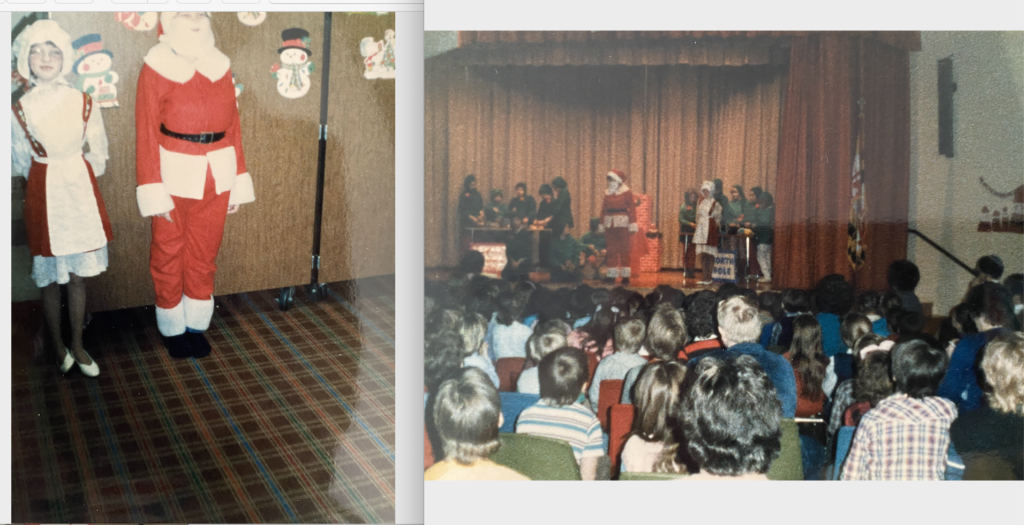Every year it’s the same. And the older you get, the more the same it is. The food, music (UGH. Christmas carols), holiday parties, ugly sweaters, decorations, the gifts – they are all still here on Earth a year later waiting to be drug out of the closet, the recipe box, the playlist. It doesn’t matter if you are celebrating Christmas, Hannukah, Diwali, or Kwanzaa – the same thing happens annually, and most people look forward to the occasion. Even though Christmas especially is commercialized ad nauseam.
So my question is, why don’t (most) people ever get bored of the same thing every year? And, an even more puzzling question – why do I HAVE to have a pumpkin spice latte or it’s not Fall and, therefore, I physically, emotionally, and mentally cannot prepare myself for the holidays?
There are two kinds of people in the world: those who Scroogely grumble when seeing Christmas decorations in shops two months before the holidays and those who get a tingly peppermint feeling inside.
I tend to fall into the Grinch category and generally have feelings of disdain and disgust toward the latter. I am perplexed by my sister who puts up five Christmas trees every year throughout her house. She must have as many boxes of Christmas decorations as I have of belongings which she springs from her attic the day after Thanksgiving. She’s the only person I know who likes getting Christmas decorations for Christmas. On the other hand, I have one box of decorations with a one-foot artificial Charlie Brown Christmas tree tucked inside, and if I happen to be home for the holidays, or have a home for the holidays, it may or may not get displayed.
But even this curmudgeon has my (very private) moments of holiday enjoyment while wrapping gifts and listening to my favorite Christmas rock songs. (Shhh. Don’t tell a soul.) And every year, I wonder why. Why do I have nostalgia for the holidays?

Instead of being burned out by repetition, humans seem to look forward to doing the same things over and over again, year after year – and especially on an annual basis. We value tradition, we count on people to be in on it with us – to have a gift exchange, to cook their signature recipe, to host the party, etc. And people love to share these traditions with their children and see them experience the fun and excitement (even if some of that excitement died down for the adults.)
Of course, if people are depressed or are grieving or alone, the holidays can take on a whole new meaning and become a painful remembrance, not a celebration. It becomes a thing to begrudgingly drift through and loses its joy.
But most people look forward to holidays, even if they are overdone, repetitive, and predictable. And maybe especially for those exact reasons.
Is it time going by so fast that makes us cling to simple pleasures and things we hold dear, to grasp after them year after year? Hanging ornaments on the tree, baking cookies, making that special pie, waiting to be kissed under the mistletoe? Or is it the family aspect and wanting to spend quality time together that drives us to keep up the traditions? What goes on inside our brains that triggers such an emotional response to the past and to our memories that we wholeheartedly wish to repeat them? And when did humans first start feeling nostalgic?
It’s not just the winter holidays we get nostalgic for, but all the holidays. Do we yearn for these holidays to keep us on track with things – Valentine’s Day to remember we have love (or wish we did), Memorial Day to get excited about the approaching summer, Labor Day to prepare for Fall and cooler weather, Christmas to remember the spirit of giving and the more religious aspects? Yes, people value tradition, but why? To remember we exist for only a limited time? To organize our thoughts so we can keep track of memories and which years they occurred?
First, it’s important to understand that nostalgia doesn’t necessarily mean “good memories”. Even negative emotions can get stored up and produce the feeling of nostalgia, which is more “complex, bittersweet” than simply pure joy, according to Clay Routledge a professor of psychology who wrote a book on nostalgia.
The word “nostalgia” was first used by a Swiss physician who used it to describe soldiers’ experiencing what we today refer to as “homesickness”. It comes from the Greek “nostos” which translates to “homecoming”, “escape” or “returning” and “algos”, meaning “pain” or “suffering’. It was considered a serious condition and used as a medical term, even in the U.S. Civil War, being described as the cause of death of soldiers. It wasn’t until the 1920s that it took on its more modern meaning “wistful yearning for the past”, perhaps due to French literature, according to Etymonline.com.
Emotion can stimulate nostalgia, but so can sights, sounds, and smells. The emotion can be subtle, yet cast great influence. We can watch a movie and see a scene of New York City and get nostalgic for the time we visited and shared meals with friends and it makes us want to book another flight and have a similar experience all over again. We can get a whiff from a bakery and remember standing in Grandma’s kitchen, or, for me, open a can of peaches and remember sitting with my Grandfather in his kitchen huddled behind the coal stove, and then my brain remembers the smell of his house, of him, and then I miss him and the memory is tinged with sadness. But, oh, such a good memory to have.
Nostalgia is a form of self-reflection. There hasn’t been a lot of research done on nostalgia or where in the brain it occurs and why. It’s attached to memory, we know that much. Certain regions of the brain will light up if a person is shown items like a Christmas tree, but no one knows why. Neuroscience, which encompasses neurology, biology, and psychology is a very new discipline, which is why it’s such an exciting field to be in right now.
What we do know is that memories triggered in the hippocampus affect the release of dopamine. This could mean that nostalgia helps us feel good and is also used as a coping mechanism. According to this journal article published in Oxford University Press, “nostalgia is not only bittersweet but also regulates negative states, soothing emotional conflict.”
According to Jacob Juhl, a neuroscience author, “One big trigger of nostalgia is feeling lonely. When people are alone, they don’t have a close sense of support, at least immediately with them, and they tend to feel nostalgic in response to this. Research has shown that nostalgia, in turn, boosts a sense of social connectedness with other people. Similarly, when people feel that life is meaningless or perhaps they’re bored, that triggers a sense of nostalgia, and nostalgia in turn increases a sense of meaning in life. Therefore, the primary purpose of nostalgia is to help people cope with negativity and provoke more positivity.”
So it would seem this form of introspection can play a positive role, even if it initially produces negative feelings. Personally, I like feeling sad once in a while because I know I can’t be truly happy unless I can also experience its opposite.
Which of the two groups do you fall into? Are you a Grinch or Buddy the Elf? And for what things do you get most nostalgic? Do you think nostalgia plays mostly a positive role in your worldview or a negative one? More importantly, how does your nostalgia affect your present mood?
Such deep questions for a Monday! Below you’ll find yours truly as Mrs. Santa Claus in my 5th-grade play. I begged and begged Mrs. Kolb to let me have the part. She did but then removed all the singing solos, which I always resented (but it was probably a necessary edit).

- Does Serving Others Make Us More Humane? - January 12, 2024
- CBD Oil and My Missing Thoughts - October 26, 2023
- How Do We Stay True to Ourselves? - February 26, 2023